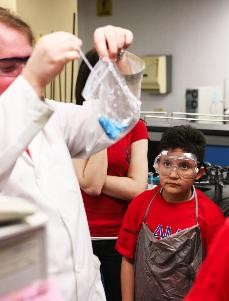A small class of fourth-grade students from South Phoenix, calling themselves the “”class of 2021,”” toured the UA campus Saturday, excited to see what college was like after talking about it for so long with their teacher.
Vanessa Valenzuela graduated from the UA in 2008 and is now a teacher at Ignacio Conchos Elementary School in South Phoenix. She is part of the Teach for America program, designed to help make sure every student in the country has an opportunity for higher education.
“”I think a big part of this is giving them an image of what college is, so when I say ‘college’ they have a picture,”” Valenzuela said. “”Also, just to feel welcome here and feel that the door is in no way closed for them.””
Teach for America is a program where teachers commit to a two-year period to work in America’s neediest schools.
Pearl Chang Esau, executive director of Teach for America, said teachers who work for this program go above and beyond to help their students catch up.
“”This has nothing to do with their potential. Every child can succeed if you give them the opportunity to succeed,”” she said.
It might seem strange for a fourth-grade class to already be thinking about college, but Valenzuela said she wants students to realize that college is a possibility for them so they do have the opportunity to, one day, go to college.
“”When I had them write about their dreams for themselves, some of them, their biggest aspiration was to work at Wal-Mart,”” Valenzuela said. “”Which is totally fine and acceptable and I told them that. But it could be powerful for some of them to start thinking of college now and keeping that long-term goal in mind.””
Keyvohn Howard, one of Valenzuela’s fourth graders, said she aspires to be a basketball player or a professor at the UA.
“”I don’t know what subject to teach yet, because I haven’t done everything yet so I’ll just figure it out when I’m older,”” Keyvohn said.
Valenzuela also said proposed budget cuts would make the situation even harder for these students, many of whom come from lowerð-income areas. She is also from south Phoenix and came to UA on a full-ride scholarship.
“”I know all of my parents care about their kids and are very invested and work side-by-side with me, but I know that that just won’t be a reality for some of them if that money isn’t there – like it wouldn’t have been a reality for me,”” she said.
Augustine Jimenez, a member of the board of directors for the University of Arizona Foundation, financed the students’ trip so they could see the possibility of going to college.
“”They come from disadvantaged situations in south Phoenix and most of them would never have an opportunity to come down to Tucson to see the university if it wasn’t for something like this,”” he said. “”Hopefully they will have the same experience I had which is that it’s a beautiful, friendly and welcoming place.””
Jimenez said he felt the purpose of this trip was to show the kids that there is no excuse not to want to achieve a higher education.
“”They are fourth graders; anything is possible,”” he said. “”Every single one of them is a minority, but that provides them with opportunities like scholarships, job placements and it’s a blessing to be bilingual.””
Jimenez said he wants these kids to have the mindset that college is a reality.
“”If you’d never seen it, it just seems like a mirage,”” he said. “”We want them to see it, to feel it, to experience it now so that they believe that they do belong here.””
Valenzuela said that although Teach for America works in lower-income areas, that doesn’t affect the parents’ dedication to their children’s education.
“”The families are working hard and they are working hard for their children,”” she said. “”They are ordinary families, ordinary kids and I’m just teaching them my part to push them a little further.””









